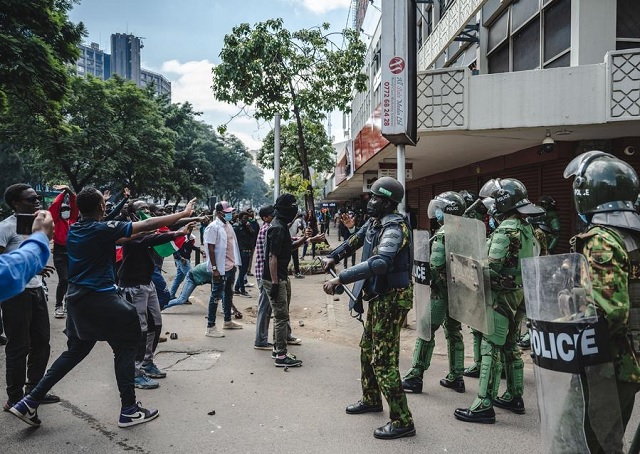
NAIROBI, Kenya | Xinhua | Protests continued in Kenya on Thursday, albeit on a smaller scale, despite President William Ruto’s decision to drop tax hike proposals and his promise to institute austerity measures.
Hundreds of people took to the streets of various towns across Kenya, though their numbers were notably fewer than earlier in the week. They defied pleas from Ruto and his deputy, Rigathi Gachagua, who on Wednesday had urged them to call off the protests and engage in dialogue with the government.
The demonstrators said they were protesting in memory of their colleagues who had died or been injured in previous rallies. In Nairobi, the capital, military personnel and anti-riot police officers manned most of the streets. On some streets, protesters lit candles and placed them alongside rose flowers, singing funeral songs. They also wrote the names of those allegedly killed in the protests on manila papers, listing 18 names, most of whom were in their 20s.
At least six people lost their lives and some 214 others were injured in Tuesday’s protests, according to the government. Most of those who died were killed at the parliament as police opened fire on protesters who had breached security to storm into the institution. Ruto expressed regret over the deaths and said that the government would create a framework to ensure accountability.
The protesters later clashed with police on Thursday in downtown Nairobi, who tried to disperse them using tear gas. Several protesters were arrested and taken away in police vehicles. Security checks were heightened on all major roads leading to Nairobi’s central business district, but the military personnel did not engage in confrontations with the people.
“I joined Kenyans in holding a vigil and observed a moment of silence for all we have lost during this period,” said Justina Mungai, a protester. She expressed satisfaction with Ruto’s decision to withdraw the Finance Bill 2024 but insisted that the government should allow them to mourn their colleagues on the streets.
“Those who were killed were peaceful protesters fighting for our rights. Today’s protests are about them; we shall never forget them,” she added.
The protesters also demanded more concessions from Ruto, including fighting corruption and dismissing certain cabinet secretaries accused of corruption.
Away from Nairobi, protests were also held in the coastal city of Mombasa, where police engaged protesters in running battles as demonstrations turned violent. Some people took advantage of the chaos to steal from the public, with many losing wallets, handbags and mobile phones.
Similar violent protests occurred in Kisumu, a lakeside city in western Kenya, where protesters clashed with police. The protesters had threatened to storm the region’s State Lodge, but security officers managed to negotiate with them to prevent the attempt. Incidents of looting were reported, with people invading a supermarket and robbing pedestrians.
In Eldoret, a different kind of protest took place, where anti-protesters armed with weapons roamed the town to prevent any demonstrations.
On Wednesday, Ruto dropped the Finance Bill 2024, which included taxation measures that lawmakers passed on Tuesday to raise an additional 346.7 billion shillings (about 2.67 billion U.S. dollars) to fund the country’s 31 billion dollar budget for the financial year 2024/2025.
“Following the passage of the bill, the country witnessed protests and destruction of constitutional institutions. Listening keenly to the people of Kenya, who have said loudly that they want nothing to do with this Finance Bill 2024, I concede and, therefore, I will not sign it, and it shall subsequently be withdrawn,” Ruto said Wednesday.
United Nations Human Rights Commissioner Volker Turk said in a statement on his social media handle on Thursday that he was saddened by the protests and violence in Kenya, which had led to deaths and injuries. “I urge restraint to facilitate the rights to peaceful assembly and expression, and dialogue to listen to the voices of young people. Investigations and accountability are essential,” he said. ■
 The Independent Uganda: You get the Truth we Pay the Price
The Independent Uganda: You get the Truth we Pay the Price





